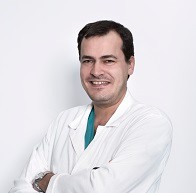Rise of the Robots
Gruppo Ospedaliero San Donato (GSD)
Robotic surgery has, says Dr Alberto Briganti, prompted a “dramatic change in our clinical practice”. For some treatments of diseases such as prostate cancer, Briganti explains that the Urology department at San Raffaele Hospital has “shifted towards a completely robotic approach.” Indeed, the vast majority of prostate and kidney cancer operations are now conducted on one of the urology department’s three Da Vinci robots.
Widely recognised as one of the leading urology departments in Europe in terms of both caseload and research output, it is “moving towards being almost entirely oncological.” Briganti explains that oncological diseases in terms of uro-oncology are highly prevalent with prostate cancer being the most prevalent cancer among the male population. While the field of urology is quite broad with many benign diseases falling under its umbrella, oncology is where most of the cutting edge work is done.
The rise of robotic surgery technologies and techniques has been “absolutely important for uro-oncology.” Briganti is keen to draw attention to the fact that in 2006 “we were the first unit in Italy to have robotic surgery available” with the department now boasting “a full robotic programme.”
The urological community, continues Briganti, has accepted robots so positively as it is a speciality that is particularly well suited to exploit the benefits of robotic surgery. “We work in a very tiny area full of blood vessels. Initially operations like radical prostatectomy were limited by high bleeding and a very tiny operative space. The robot allows us to work with more space and less blood loss. Urology works in spaces that are much more accessible with a robot than without.” As a result, while he acknowledges that there is an ongoing debate about how much, if at all, robotic surgery improves outcomes, he is adamant that “at the end of the day the peri-operative and functional outcomes are better.”
Briganti concedes however that there are a variety of outcomes and that robotic surgery is not changing long term cancer control outcomes as the success in removing a tumor is a success no matter how it was removed. That said, Briganti explains that it “certainly improves perioperative outcomes” as patients require shorter hospital stays for their recovery, lose less blood during the operation and are able to “return to their normal activity much faster.” This is a great benefit as cancer patients become younger as they tend to want to return to their normal lives and work even sooner.
Briganti is clear that robotic surgery has transformed the field of uro-oncology but it has also transformed the way surgeons work as well as the way they train. There are, he says, “studies that say becoming a better surgeon using robotics is less difficult than becoming a good surgeon using an open approach.” Briganti though, refuses to concede this point stressing that in both forms of surgery “it’s training, training, training.” “While the goal of an operation is the same no matter the technique used, a surgeon must “of course learn the skills of robotics,” he says. The movements he explains, are different as the surgeon is “looking at a 3D setting” and is working with significant “visual magnification”. “When we first started with the robotic approach we went to the best surgeons to learn how to do it.” It is, he stresses, “the same mentorship or tutorship as in any other surgical field. You have to train the same amount for both.”
Teaching is something that Briganti knows a great deal about. His department is the most sought after urology department in the country for residencies. There are always four residents in the department as well as visiting fellows and the students pursuing a ‘masters’ in robotic surgery where students are “taught to use them as well as being provided training and mentorship on using the robot.”
“The way we teach has changed significantly.” he says. Indeed, robotic surgery has not only revolutionized surgical practice, it has allowed for even closer learning experiences for residents and fellows. “The way we teach has dramatically changed with the advent of these minimally invasive surgical approaches. Now, it is a more interactive way of teaching. My personal perspective is that as long as you have a more interactive approach it ought to improve outcomes.” There is, he continues, a robotic surgery system with a “dual console so you can sit down at the second console and the first surgeon is doing the case and the student watches and control can be switched over.”
In addition to clinical excellence, Briganti is keen to highlight the research activity the department undertakes as another major attraction to both students, residents and fellows. That activity consists of both clinical and translational research. He explains that a key pillar of that work has been compiling a database where all patients we treat are assessed and included specific disease databases. It is, he says, “clinical outcome research.” The department’s research has produced prediction models for predicting the presence of lymph node invasion in prostate cancer as well as frameworks that have been included in international cancer guidelines.
Briganti obviously takes great pride in explaining just how prolific the department is, saying that it is the top contributor to the European Association of Urology in terms of accepted contributions over the last years. He stresses that the research conducted has a strong impact on clinical practice saying that “the clinical activity we do in terms of research must have an impact on medical practice. Our efforts aim at actually developing a practice change research.”
Briganti is able to undertake translational research thanks to the fact that the department has its own lab that acts as “a bridge between basic science and clinical practice. “We are,” he says, “one of the very few centers that has facilities for both clinical and basic science research.”
“All our departments,” he continues, “do clinical work and the first thing you have to have is credibility. First you have to be a good surgeon or clinician before you can have a research impact. Reputation is not built on clinical work alone, it is also done through publications and the recognition you receive.” It is this combination of research prowess and education that helps maintain San Raffaele’s urology department as one of Europe’s best.


